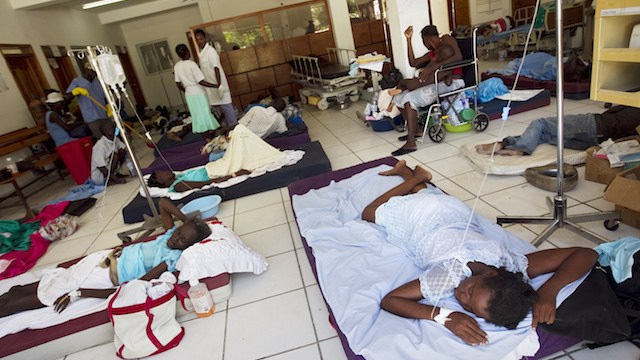SUMMARY
This is AI generated summarization, which may have errors. For context, always refer to the full article.

NEW YORK CITY, USA – Victims of a Haiti cholera epidemic Wednesday, October 9, filed a lawsuit demanding compensation from the United Nations over an outbreak that killed more than 8,300 people.
The petition, filed on behalf of a sample group of five Haitians at the New York district court, said at least 679,000 other people had fallen ill with cholera since the outbreak began in October 2010.
There had been no cholera in Haiti for at least 150 years until it was brought by UN peacekeeping troops from Nepal, lawyer Ira Kurzban told a news conference.
The United Nations said in February it was legally immune from action over the epidemic and a spokesman said Wednesday that comments from previous months still stood.
Spokesman Farhan Haq said of the lawsuit: “The UN remains committed to do all it can to help the people of Haiti overcome the cholera epidemic.
“It is not UN practice to discuss in public claims filed against the organization.”
The New York court now needs to decide whether the case can go ahead. The lawsuit has been filed in the city where the United Nations is headquartered. New York also has a substantial Haitian community.
The source of the cholera epidemic was traced to a river that runs next to a UN camp in the central town of Mirebalais, where Nepalese troops had been based. The strain of cholera the deeply impoverished Caribbean nation is the same as one endemic in Nepal.
“The outbreak resulted from the negligent, reckless, and tortious conduct of the defendants,” said a copy of the petition seen by Agence France-Presse.
It lists the defendants as the United Nations, the UN Stabilization Mission in Haiti and at least two of their officers.
“We feel in this lawsuit we’re going to win,” Kurzban told reporters. “This is a unique set of circumstances for which the United Nations cannot behind the shield of immunity.”
The US-based Institute for Justice and Democracy in Haiti (IJDH), which is representing 8,000 victims and families of those who died, says cholera continues to kill about 1,000 Haitians a year.
In May, the victims gave the United Nations a 60-day deadline to reach a compensation deal or face a lawsuit.
Lawyers at the time sought $100,000 for the family of each victim who died and $50,000 for each survivor, which could take the claim into several billion dollars.
On Wednesday IJDH spokeswoman Beatrice Lindstrom told reporters it would up to the jury to set the limits of the compensation figure in court.
The epidemic dealt a new blow to Haiti as it struggled to overcome the strife caused by a January 2010 earthquake that killed 250,000 people.
The UN said in February that the complaint from victims’ lawyers was “non-receivable” under a 1946 convention setting out the UN’s immunities for its actions.
In December, UN Secretary General Ban Ki-moon launched a $2.2 billion appeal, however, to raise money to provide clean water and health facilities in Haiti.
Kurzban accused the United Nations of stonewalling and said it had failed to meet fundraising goals on efforts to provide clean water and proper sanitation in Haiti.
He said lawyers would fight to the end and appeal if the New York district court dismisses the case.
“We’re certainly going to continue to fight this case. We believe very strongly in the principles of accountability for the United Nations,” he said.
Lindstrom said that studies had shown it would take 10 years and $2.2 billion to bring an end to cholera.
The petition said the Haiti epidemic had also resulted in additional cholera cases in Cuba, the Dominican Republic and the United States, at least. – Rappler.com
Add a comment
How does this make you feel?
There are no comments yet. Add your comment to start the conversation.